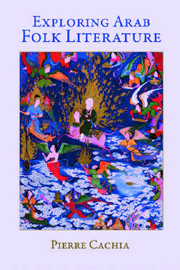Book contents
- Frontmatter
- Contents
- Acknowledgements
- Dedication
- Foreword by Professor Clive Holes
- Introduction
- The Transcription of Both Classical and Colloquial Arabic
- Part 1 Fact Finding
- 1 Arabic Literatures, ‘Elite’ and ‘Folk’ – Junctions and Disjunctions Quaderni di Studi Arabi, Nuova serie, 3 (2008)
- 2 The Egyptian Mawwāl: Its Ancestry, its Development, and its Present Forms Journal of Arabic Literature, 8 (1977)
- 3 The Nahḍa‘s First Stirrings of Interest in Alf Layla (previously unpublished).
- 4 The Career of Muṣṭafā > Ibrāhīm < Ajāj: A Giant of Egyptian Popular Literature Across Cultures, ed. Daniel Massa (Valletta, Malta, 1977)
- Part 2 Single or Related Items
- Part 3 Cultural and Social Implications
4 - The Career of Muṣṭafā > Ibrāhīm < Ajāj: A Giant of Egyptian Popular Literature Across Cultures, ed. Daniel Massa (Valletta, Malta, 1977)
from Part 1 - Fact Finding
Published online by Cambridge University Press: 05 February 2015
- Frontmatter
- Contents
- Acknowledgements
- Dedication
- Foreword by Professor Clive Holes
- Introduction
- The Transcription of Both Classical and Colloquial Arabic
- Part 1 Fact Finding
- 1 Arabic Literatures, ‘Elite’ and ‘Folk’ – Junctions and Disjunctions Quaderni di Studi Arabi, Nuova serie, 3 (2008)
- 2 The Egyptian Mawwāl: Its Ancestry, its Development, and its Present Forms Journal of Arabic Literature, 8 (1977)
- 3 The Nahḍa‘s First Stirrings of Interest in Alf Layla (previously unpublished).
- 4 The Career of Muṣṭafā > Ibrāhīm Across Cultures, ed. Daniel Massa (Valletta, Malta, 1977)
- Part 2 Single or Related Items
- Part 3 Cultural and Social Implications
Summary
For about a thousand years, perhaps even longer, Arab creativity has found outlets not only in lofty compositions retaining the syn tax (if not always the vocabulary) of the language in which the Qur>ān was revealed, but also in the coining of proverbs, the sing ing of songs, the recitation of poems, the telling of tales and the presentation of rather rudimentary playlets and puppet shows, all in the local dialects. Yet the immensely powerful and constant at tachment of Arab intellectuals to their ‘classical’ language was such that only texts couched in this idiom were deemed worthy of serious attention, and it is these alone that Arab scholars and Orientalists alike habitually call ‘Arabic literature’ without further qualification. Anything expressed in the colloquial, when not openly scorned, was looked upon as mere entertainment; more often than not the text went unrecorded, the artistry unrecognised, the author unremembered. Modern Arabs have altered their attitude to the language quite substantially in some respects, but – perhaps for the very reason that they are caught up in momentous social and intellectual changes – only a handful of scholars among them have begun to give serious attention to this ‘popular literature’, which they are used to treating with more familiarity than respect.
The character of this literature, and above all the lines of demarcation between it and the literature of the educated elite, are not as easy to determine as may seem at first sight.
- Type
- Chapter
- Information
- Exploring Arab Folk Literature , pp. 51 - 58Publisher: Edinburgh University PressPrint publication year: 2011



